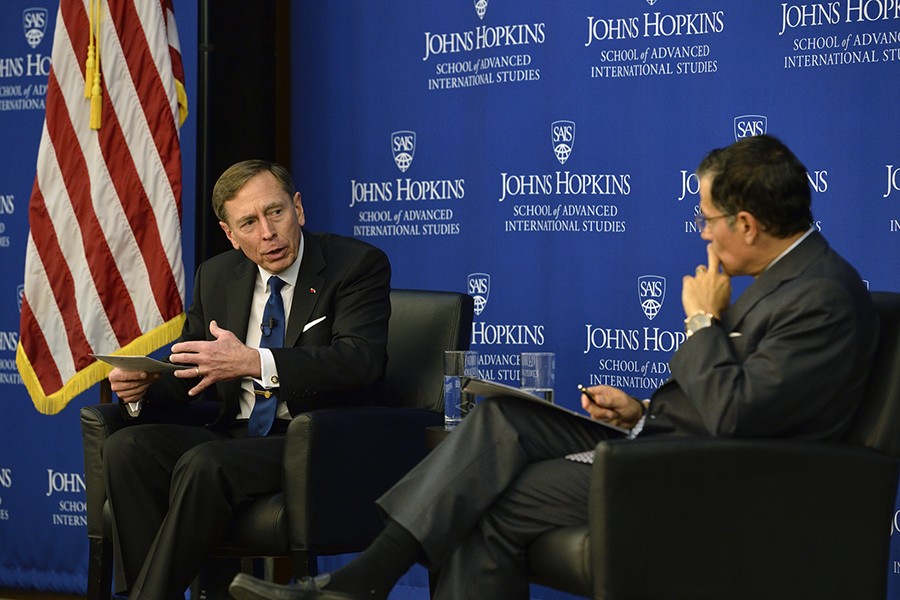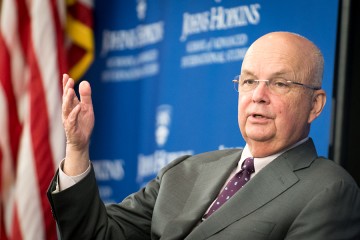Ret. Gen. David Petraeus sees the United States as entering a new era of geopolitical conflict, and he says the stability of the global order depends on the thinkers and leaders of tomorrow who are learning their lessons today.
Speaking Thursday at the Johns Hopkins University School of Advanced International Studies in Washington, D.C., he advocated the return of the kinds of comparative politics studies that he says have fallen out of the mainstream during democracy's global rise in the 20th century.
"This is a return to great power rivalries," he said. "You have a rising China—rapidly rising, achieving something that no other country has ever done in history, which is two decades straight of double-digit GDP growth. That's really quite extraordinary. And by the way, that is a different system [of government]. It is a competitor."
Video credit: School of Advanced International Studies
He explained that a deeper, more nuanced understanding of our opponents will help the U.S. achieve more military victories. It's a lesson he said he would've liked to have known before he led the 2007 military surge in Iraq.
Petraeus is the four-star general who commanded U.S. coalition forces in 2007 and 2008 in Iraq; led U.S. Central Command from 2008 to 2010; and commanded coalition forces in Afghanistan from 2010 to 2011. Following his retirement from the military, he served as director of the Central Intelligence Agency.
Speaking with SAIS Dean Vali Nasr for the inaugural David H. Bernstein Forum, Petraeus laid out some of the lessons he learned from his time leading the fight against terrorism:
Extremists will exploit ungoverned spaces. "It's not a question of if, it's a question of when," he said.
Intervention is necessary, because the violence associated with extremism is not confined to one location forever. "Las Vegas rules do not apply," he quipped.
The U.S. is most likely going to have to lead global interventions against extremism, because America has the firepower, the manpower, and the economic power to sustain an attack.
A comprehensive civil military campaign in occupied areas is essential to success. "The paradox of these fights is that you cannot counter terrorist forces like the Islamic State and Al Qaeda with just counter-terrorist force operations," he said. "You can't drone strike or Delta Force raid your way out of this problem."
Finally, he said, part of the solution is establishing a sustainable attack. "This is the fight of a generation, therefore a sustained commitment is required," he said.
Though much of his talk focused on his assessment the foreign policy issues facing the U.S., Petraeus wove through the discussion a theme of the lessons he learned off the battlefield.
He said that his time at Princeton University, where he received his master's degree and PhD, were as formative for him as his time in military theater.
"The experience of going to a place where there are seriously bright people, professors who are seriously rigorous, individuals who do not see the world the way you do at all ..., it's that kind of experience that prepares you for the moment when all the sudden, you're in the streets of Mosul and you realize that you own this darn thing, that you are the Occupation Force Commander by the Geneva Convention, which means you are the executive, legislative, and judicial all in one, and all eyes are turned to you, and you fall back on very rudimentary concepts [that you learned in school]."
He also explored the lessons he learned through failure, referencing only obliquely the 2012 personal and professional scandal that resulted in him resigning from the CIA and pleading guilty in 2015 to a misdemeanor charge of mishandling classified information.
"Life is not full of high-five moments," he said. "Those who prevail and gradually achieve success are individuals who have the resilience, and who have the awareness, to say 'OK, let's look at this—what took place, what can we learn from it?' and then move forward with those lessons in mind."
The forum—endowed by the Johns Hopkins University alumnus and former member of the board of trustees, David H. Bernstein—will bring to SAIS speakers of renowned international stature to discuss various issues affecting global policy. The forum will take place four times a year and will not be limited to one programmatic topic.
Posted in Politics+Society









